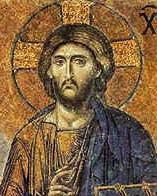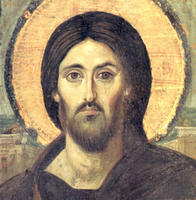

Raised a Roman Catholic; spent five years in a Catholic religious order, The Society of Mary; left the Church; married; spent twelve years as an Episcopalian; discovered Buddhism in 1974, and except for two years exploring the Hindu tradition --- remained some kind of Buddhist. I've explored Zen, Theravada, Tibetan in my sincere and somewhat haphazard fashion, and, presently am, more or less, a Shin Buddhist.
However, between June 2000 and June 2001 I returned to the Episcopal Church and through coming into contact with an extraordinarily brilliant rector and his small study group every Wednesday I came to know Jesus from a fresh perspective. One that engendered both love and respect in a way that the Jesus Christ of my upbringing never did.
I suppose Jesus to me before 2000 was God walking around appearing to be a man. Yes, I know the Church in the Nicene Creed says something Christ being fully God and also fully man. However, that concept was never "felt" by me.
The book that "turned my mind" (a Buddhist phrase) was Marcus Borg's "Meeting Jesus Again -- for the First Time". Borg brought up Lutheran, now Episcopalian is Hundere distinguished Professor of Religion and Culture at Oregon State University and the author and author of two other books -- "Reading the Bible Again for the First Time," and "The God We Never Knew."
He co-authored another excellent book with N.T. Wright, an Anglican clergyman --"The Meaning of Jesus: Two Visions".
So, which "one" will win out: Buddhism or Christianity?
Well, I think one can be both. It's what's real; what works.
I have friend who is a JuBu --Jewish Buddhist or Buddhist Jew.
What I do know is that this interest in Jesus as seen from a new angle has proved fascinating for me. I am even beginning to read the Gospels once more.
----------
Now for the historical search for Jesus---
One of the most respected scholars in this area is John Dominic Crossan, an Irish scholar who has lived in the USA for most of his life. His focus has been discovering everything we can be reasonably sure about Jesus the person.
Other authors dealing with this issue which I've read include Marcus Borg, Geza Vermes, Elaine Pagels, N.T. Wright, and Neil Douglas-Klotz.
I suppose the question that comes to many persons' mind would be ---"Why do we need any historical research? We have the Four Gospels and the rest of the New Testament."
Actually, the Four Gospels, and, in fact the entire New Testament were only a relatively small segment of the total "scriptures" or writings about Jesus that were extant at the time the New Testament was written (50-110) A.D. They are incomplete in many ways. The Gospels, themselves, do not always agree with each other. When carefully read, one finds that the Gospels are not biographies of Jesus, nor even histories, but four accounts written by people whose identity we are not sure of and who are providing for us a theological interpretation of Jesus framed by their viewpoint and perspective. Each Gospel author created an image of Jesus that he believed in and/ or he felt important for others to see.
Another thing to consider: how did we receive this collection of religious writings called the New Testament? Who selected the writings or scriptures that were then determined to be "inspired by God"?
The simple answer is a group of churchmen, mostly important ones, i.e. bishops, e.g. Iraeneus,
Alexander, Athanasius---key figures in one segment of Christian leaders who wanted a very definite set of writings to become the "canon" of scripture for all Christians. And, who also wanted a list of propositions or doctrines to which all true Christians were assent. Those who did not accept this "Canon" and this list, i.e. The Nicene Creed, would be considered heretics.
They felt, especially before the advent of Emperor Constantine, that a very organized, tightly knit christian or catholic church would have a better chance of survival in a pagan empire and among competing religious groups, including those termed "Gnostic Christians" and the Jews. During the first century B.C. Judaism was having remarkable success in their conversion efforts especially among the pagans.
The Council of Nicaea, in the Fourth Century, was convened by orders of Emperor Constantine.
He had been converted to Christianity because he had seen a cross in the sky just prior to a crucial battle. He prevailed and became convinced it was because Christ had favored him.
As a result of the battle he re-united all of the Roman Empire and determined that Christianity would be the "state" religion.
He felt that there should be one Emperor with loyal citizens ---and there should be one Church with believing and faithful members. The acceptance of the Canon of Scripture, and the assent to the Nicene Creed then determined who were "real" Christians and who were heretics. Those Christians designated as heretics may have included half of the Christians in the empire.
"The emperor ordered all 'heretics and schismatics' to stop meeting, even in private houses, and to surrender their churches and whatever property owned to the catholic church." (Beyond Belief, by Elaine Pagels, p.174)
Christians today as at the time of Constantine have a faith limited by the confines of the New Testament Canon and the Nicene Creed.
My personal belief is that we have--to a surprising degree--lost a direct connection to the Jewish peasant, connected so totally to God, who preached a way of life that would lead to our salvation/ liberation.
Furthermore, I see Christianity, to be to a large extent a creation of Paul of Tarsus and John. Both men, I'm sure, were sincere in what they believed, but the contributions they made, followed by those of leaders like Irenaeus, Alexander and Athanasius---created "Christianity". However, as I said before, I do not equate Christianity with Jesus' spiritual way. Christianity is to a large extent built upon the Jesus as perceived by those who came after him.
This is why I seek the historical Jesus because, to me, he had a message that has been obscured and distorted often by Christianity as we know it.
----------
What is the approach of a Jesus scholar such as John Dominic Crossan?
Crossan's method was to locate the "historical Jesus where three independent vectors cross."
(Jesus, A Revolutionary Biography, Crossan, p.xi)
- "The first vector is cross-cultural anthropology, based not just on this or that society but on what is common across history to all those of the same ecological and technological type."
- "The second vector is Greco-Roman and especially Jewish history in the first quarter of Jesus' century."
(ibid)
The last vector to Crossan is the most difficult, probably because it is both complex and less clear cut. In searching for this person known as Jesus the scholar does not limit himself to the Jesus of the four Gospels as we know them.
When considering the various writings about Jesus, his person, life and teaching, the scholar must deal with levels of material:
"...three successive levels ---involving retention of original Jesus materials, development of those retained materials, and creation of totally new materials---are found alike in gospels both inside and outside the New Testament " (ibid)
""...Differences and discrepancies among accounts and versions are not due primarily to vagaries of memory but to quite deliberate theological interpretations of Jesus."
"...in summary, what those first Christians experienced as the continuing presence of the risen Jesus or the abiding empowerment of the Spirit gave the transmitters of the Jesus tradition a creative freedom we would never have dared postulate had such a conclusion not been forced upon us by the evidence." (ibid)
all for now, bob
P.S. I realize that there are many Christians that completely object to most of the above. For example, I have a former colleague of mine with whom I frequently have email interchanges ---usually on the topic of religion or politics. He is very intelligent, expresses himself with clarity and cogency; however, we don't have a common vision when it comes to religion.
He believes that the Canon of Scripture was determined by the work of God or the Holy Spirit. He also believes that the entire Canon, both Old and New Testament in every sentence bear the mark of divine inspiration. Finally, that our job as Christians is to make all of these -- often disparate elements--agree and fit together so that we can see the totality of God's message to us--- which is only revealed to us in these particular sacred writings.

